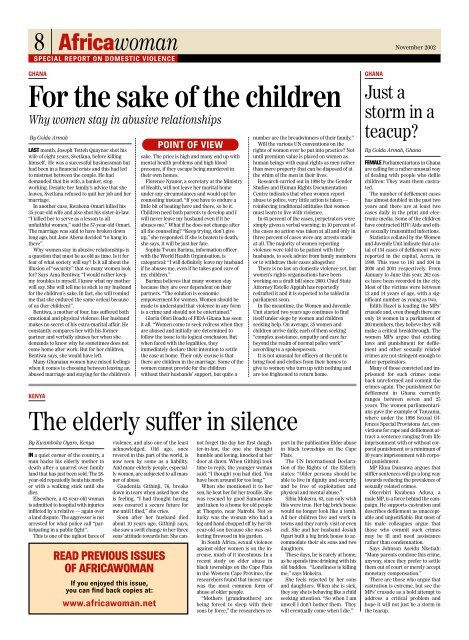Issue 7 - Domestic Violence - ColdType
Issue 7 - Domestic Violence - ColdType
Issue 7 - Domestic Violence - ColdType
Create successful ePaper yourself
Turn your PDF publications into a flip-book with our unique Google optimized e-Paper software.
8 Africawoman November<br />
SPECIAL REPORT ON DOMESTIC VIOLENCE<br />
GHANA GHANA<br />
For the sake of the children<br />
Why women stay in abusive relationships<br />
By Golda Armah<br />
LAST month, Joseph Tetteh Quaynor shot his<br />
wife of eight years, Svetlana, before killing<br />
himself. He was a successful businessman but<br />
had been in a financial crisis and this had led<br />
to mistrust between the couple. He had<br />
demanded that his wife, a banker, stop<br />
working. Despite her family’s advice that she<br />
leaves, Svetlana refused to quit her job and her<br />
marriage.<br />
In another case, Kwabena Omari killed his<br />
35-year-old wife and also shot his sister-in-law.<br />
“I killed her to serve as a lesson to all<br />
unfaithful women,” said the 57-year-old Omari.<br />
The marriage was said to have broken down<br />
long ago, but Jane Abena decided “to hang in<br />
there”.<br />
Why women stay in abusive relationships is<br />
a question that must be as old as time. Is it for<br />
fear of what society will say? Is it all about the<br />
illusion of “security” that so many women look<br />
for? Says Ama Bentiwa: “I would rather keep<br />
my troubles to myself. I know what my mother<br />
will say. She will tell me to stick to my husband<br />
for the children’s sake. In fact, she will remind<br />
me that she endured the same ordeal because<br />
of us (her children)”.<br />
Bentiwa, a mother of four, has suffered both<br />
emotional and physical violence. Her husband<br />
makes no secret of his extra-marital affair. He<br />
constantly compares her with his former<br />
partner and verbally abuses her when she<br />
demands to know why he sometimes does not<br />
come home after work. But for her children,<br />
Bentiwa says, she would have left.<br />
Many Ghanaian women have mixed feelings<br />
when it comes to choosing between leaving an<br />
abused marriage and staying for the children’s<br />
KENYA<br />
sake. The price is high and many end up with<br />
mental health problems and high blood<br />
pressure, if they escape being murdered in<br />
their own homes.<br />
Florence Nyanor, a secretary at the Ministry<br />
of Health, will not leave her marital home<br />
under any circumstances and would opt for<br />
counseling instead. “If you have to endure a<br />
little bit of beating here and there, so be it.<br />
Children need both parents to develop and I<br />
will never leave my husband even if it he<br />
abuses me.” What if he does not change after<br />
all the counseling? “Keep trying, don’t give<br />
up,” she responded. If she is beaten to death,<br />
she says, it will be just her fate.<br />
Sophia Twum Barima, information officer<br />
with the World Health Organisation, is<br />
categorical: “I will definitely leave my husband<br />
if he abuses me, even if he takes good care of<br />
my children.”<br />
Barima believes that many women stay<br />
because they are over dependent on their<br />
partners. “The solution is economic<br />
empowerment for women. Women should be<br />
made to understand that violence in any form<br />
is a crime and should not be entertained.”<br />
Gloria Ofori Boadu of FIDA-Ghana has seen<br />
it all. “Women come to seek redress when they<br />
are abused and initially are determined to<br />
follow the issue to its logical conclusion. But<br />
when faced with the legalities, they<br />
immediately declare their intention to settle<br />
the case at home. Their only excuse is that<br />
there are children in the marriage. Some of the<br />
women cannot provide for the children<br />
without their husbands’ support, but quite a<br />
The elderly suffer in silence<br />
By Kwamboka Oyaro, Kenya<br />
IN a quiet corner of the country, a<br />
man hacks his elderly mother to<br />
death after a quarrel over family<br />
land that has just been sold. The 28year-old<br />
repeatedly beats his mother<br />
with a walking stick until she<br />
dies.<br />
Elsewhere, a 62-year-old woman<br />
is admitted to hospital with injuries<br />
inflicted by a relative — again over<br />
a land dispute. The aggressor is not<br />
arrested for what police call “participating<br />
in a public fight”.<br />
This is one of the ugliest faces of<br />
violence, and also one of the least<br />
acknowledged. Old age, once<br />
revered in this part of the world, is<br />
now seen by some as a liability.<br />
And many elderly people, especially<br />
women, are subjected to all manner<br />
of abuse.<br />
Gaudentia Githinji, 76, breaks<br />
down in tears when asked how she<br />
is feeling. “I had thought having<br />
sons ensured a secure future for<br />
me until I died,” she cries.<br />
Soon after her husband died<br />
about 10 years ago, Githinji says,<br />
she saw a swift change in her three<br />
sons’ attitude towards her. She can-<br />
READ PREVIOUS ISSUES<br />
OF AFRICAWOMAN<br />
If you enjoyed this issue,<br />
you can find back copies at:<br />
www.africawoman.net<br />
POINT OF VIEW<br />
not forget the day her first daughter-in-law,<br />
the one she thought<br />
humble and loving, knocked at her<br />
door at dawn. When Githinji took<br />
time to reply, the younger woman<br />
said: “I thought you had died. You<br />
have been around for too long.”<br />
When she mentioned it to her<br />
son, he beat her for her trouble. She<br />
was rescued by good Samaritans<br />
and taken to a home for old people<br />
at Thogoto, near Nairobi. Not so<br />
lucky was the woman who had a<br />
leg and hand chopped off by her 30year-old<br />
son because she was collecting<br />
firewood in his garden.<br />
In South Africa, sexual violence<br />
against older women is on the increase,<br />
much of it incestuous. In a<br />
recent study on elder abuse in<br />
black townships on the Cape Flats<br />
in the Western Cape Province, the<br />
researchers found that incest-rape<br />
was the most common form of<br />
abuse of older people.<br />
“Mothers [grandmothers] are<br />
being forced to sleep with their<br />
sons by force,” the researchers re-<br />
number are the breadwinners of their family.”<br />
Will the various UN conventions on the<br />
rights of women ever be put into practice? Not<br />
until premium value is placed on women as<br />
human beings with equal rights as men rather<br />
than mere property that can be disposed of at<br />
the whim of the men in their lives.<br />
Research carried out in 1998 by the Gender<br />
Studies and Human Rights Documentation<br />
Centre indicates that when women report<br />
abuse to police, very little action is taken —<br />
reinforcing traditional attitudes that women<br />
must learn to live with violence.<br />
In 65 percent of the cases, perpetrators were<br />
simply given a verbal warning; in 10 percent of<br />
the cases no action was taken at all and only in<br />
three percent of cases were any arrests made<br />
at all. The majority of women reporting<br />
violence were told to be patient with their<br />
husbands, to seek advice from family members<br />
or to withdraw their cases altogether.<br />
There is no law on domestic violence yet, but<br />
women’s rights organisations have been<br />
working on a draft bill since 2000. Chief State<br />
Attorney Estelle Appiah has reportedly<br />
redrafted it and it is expected to be tabled in<br />
parliament soon.<br />
In the meantime, the Women and Juvenile<br />
Unit started two years ago continues to find<br />
itself under siege by women and children<br />
seeking help. On average, 35 women and<br />
children arrive daily, each of them seeking<br />
“complex assistance, empathy and care far<br />
beyond the realm of normal police work”<br />
according to a spokesperson.<br />
It is not unusual for officers at the unit to<br />
bring food and clothes from their homes to<br />
give to women who turn up with nothing and<br />
are too frightened to return home.<br />
port in the publication Elder abuse<br />
in black townships on the Cape<br />
Flats.<br />
The UN International Declaration<br />
of the Rights of the Elderly<br />
states: “Older persons should be<br />
able to live in dignity and security<br />
and be free of exploitation and<br />
physical and mental abuse.”<br />
Sibia Mokeira, 63, can only wish<br />
this were true. Her big brick house<br />
would no longer look like a tomb.<br />
All her children live and work in<br />
towns and they rarely visit or even<br />
call. She and her husband Josiah<br />
Ogari built a big brick house to accommodate<br />
their six sons and two<br />
daughters.<br />
These days, he is rarely at home,<br />
as he spends time drinking with his<br />
old buddies. “Loneliness is killing<br />
me,” says Mokeira.<br />
She feels rejected by her sons<br />
and daughters. When she is sick,<br />
they say she is behaving like a child<br />
seeking attention. “So when I am<br />
unwell I don’t bother them. They<br />
will eventually come when I die.”<br />
2002<br />
Just a<br />
storm in a<br />
teacup?<br />
By Golda Armah, Ghana<br />
FEMALE Parliamentarians in Ghana<br />
are calling for a rather unusual way<br />
of dealing with people who defile<br />
children: They want them castrated.<br />
The number of defilement cases<br />
has almost doubled in the past two<br />
years and there are at least two<br />
cases daily in the print and electronic<br />
media. Some of the children<br />
have contracted HIV/Aids and other<br />
sexually transmitted infections.<br />
Statistics collated by the Women<br />
and Juvenile Unit indicate that a total<br />
of 154 cases of defilement were<br />
reported in the capital, Accra, in<br />
1999. This rose to 181 and 204 in<br />
2000 and 2001 respectively. From<br />
January to June this year, 262 cases<br />
have been recorded in the city.<br />
Most of the victims were between<br />
12 and 14 years of age, with a significant<br />
number as young as two.<br />
Edith Hazel is leading the MPs’<br />
crusade and, even though there are<br />
only 18 women in a parliament of<br />
200 members, they believe they will<br />
make a critical breakthrough. The<br />
women MPs argue that existing<br />
laws and punishment for defilement<br />
and other sexually related<br />
crimes are not stringent enough to<br />
deter perpetrators.<br />
Many of those convicted and imprisoned<br />
for such crimes come<br />
back unreformed and commit the<br />
crimes again. The punishment for<br />
defilement in Ghana currently<br />
ranges between seven and 25<br />
years. The women parliamentarians<br />
gave the example of Tanzania,<br />
where under the 1998 Sexual Offences<br />
Special Provisions Act, convictions<br />
for rape and defilement attract<br />
a sentence ranging from life<br />
imprisonment with or without corporal<br />
punishment or a minimum of<br />
30 years imprisonment with corporal<br />
punishment.<br />
MP Ekua Dansuwa argues that<br />
stiffer sentences will go a long way<br />
towards reducing the prevalence of<br />
sexually related crimes.<br />
Okerchiri Kwabena Adusa, a<br />
male MP, is a force behind the campaign.<br />
He supports castration and<br />
describes defilement as unacceptable<br />
and unjustifiable. But most of<br />
his male colleagues argue that<br />
those who commit such crimes<br />
may be ill and need assistance<br />
rather than condemnation.<br />
Says Johnson Aseidu Nketiah:<br />
“Many parents condone this crime,<br />
anyway, since they prefer to settle<br />
them out of court or merely accept<br />
monetary compensation.”<br />
There are those who argue that<br />
castration is extreme, but see the<br />
MPs’ crusade as a bold attempt to<br />
address a critical problem and<br />
hope it will not just be a storm in<br />
the teacup.
















